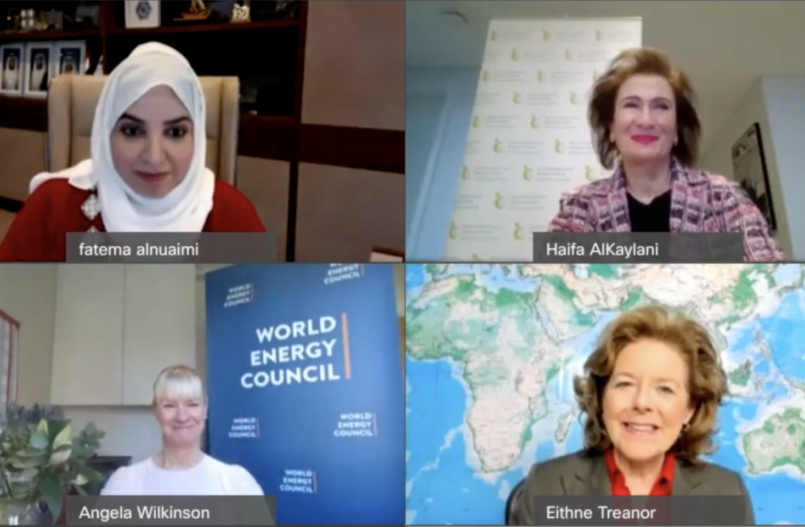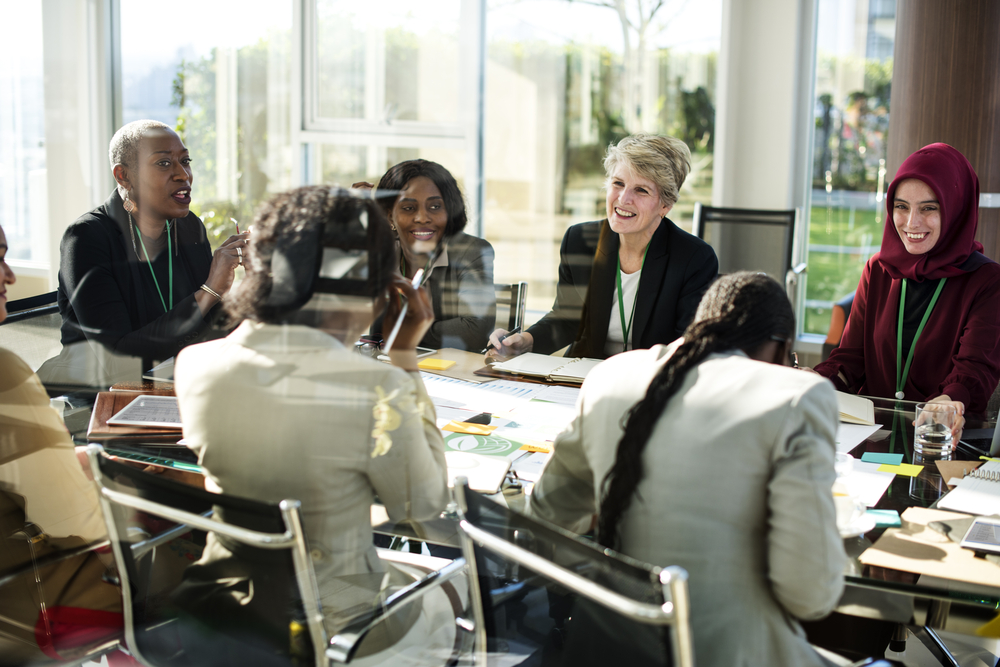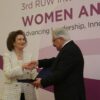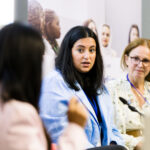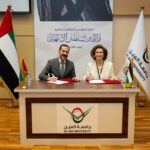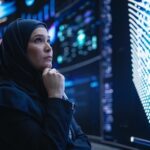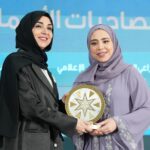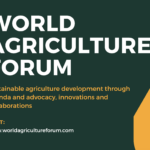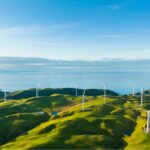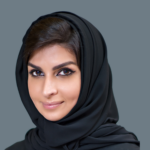A key session in AIWF’s virtual programme, Humanising Energy, was held in early November, welcoming Dr Angela Wilkinson, Secretary General & CEO of the World Energy Council; Fatema Al Nuaimi, CEO of ADNOC LNG; and Ali Al Janabi, Chairman of the Shell Group of Companies (Iraq/UAE) for a deeply engaging discussion on the human dimension of the energy sector and the need to ensure access to sustainable energy for women across the world who are disproportionately impacted by energy poverty.
The session was introduced by Haifa Al Kaylani, AIWF Founder & Chairman and moderated by Eithne Treanor, Managing Director of ETreanor Media. Even before COVID-19, the energy sector was undergoing immense transformation in the face of climate change and the transition to renewable and clean energy solutions. In 2020, across all regions, the dual impact of climate change and COVID-19 has accelerated major change in the oil and gas sector Dr Angela Wilkinson, Secretary General & CEO, World Energy Council, addressed the AIWF Webinar “Humanising Energy” in early November 2020 and in renewable energy, presenting opportunities to digitise, innovate and engage humanity and the MENA’s valuable human capital and technology resources in driving the future of energy in the region and beyond.
In her opening remarks, AIWF Founder & Chairman Haifa Al Kaylani shared that since 2010, more than a billion people have gained access to electricity, with 90% of the planet’s population connected by 2018, yet 789 million people still live without electricity today and hundreds of millions live with unreliable electricity. 2.8 billion people are still without access to clean cooking solutions, relying on wood, coal, charcoal or animal waste for cooking and heating, with exposure to air pollution increasing lung-related diseases among women (more so than men). 2.2 billion people do not have access to clean drinking water and 4.2 billion people do not have access to clean sanitation, recognising that sustainable energy has a crucial role in achieving universal access to clean water and sanitation especially for vulnerable communities and during crisis times such as the COVID-19 pandemic”.
In her Keynote Address, Dr Angela Wilkinson, Secretary General & CEO of the World Energy Council, acknowledged that AIWF and the WEC have much in common: “We both want to shape the future” in the Arab world where energy forms a part of economies and day to day life” and globally, to bring diverse and refreshing voices into the energy debate. We often forget,” she said, “that energy is essentially a story about humanity. It is more than a sector “energy is the ultimate connector of hopes and fears, of people and geography.” Dr Wilkinson continued: “The crisis reminds us all of the importance of energy in our lives. It has shown that individual actions have global impacts. The crisis is a brutal shock on society and impacts an already stressed and rapidly changing world energy system. Resilience has been tested. Recovery will not be easy. However, she said: “No crisis happens in a vacuum.”
The future of humanity depends on a new pattern of collaborative innovation which is not all or only about new energy technologies. We are promoting a new approach to collaborative innovation to help connected energy societies to move faster and further together and from very different starting points. Energy systems are evolving, and the energy future will be more decentralized and diverse. We need diversity in thinking, skills and talents to build better energy systems for better lives and a healthy planet. Only by working together on the “how to” humanise energy can we keep the future of connected energy societies open to better solutions and inspire new possibilities for human achievement.”
Fatema Al Nuaimi, CEO of ADNOC LNG, commended AIWF for choosing such a timely and critical topic for the session. “There are close to a billion human beings on this earth deprived from the very basics, in terms of access to energy. What I find inhumane is to have children deprived of their right to education just because they do not have access to energy or to have the potential of women and girls lost because they have to walk for miles to get access to water and the basics of life.” The issue had two distinct elements, she said, and this was something that energy companies needed to focus on: “to continue our contribution to provide affordable energy, and to make sure that this energy is not only accessible and affordable, but also environmentally clean and friendly”.
“We have a responsibility to make sure that we reduce our carbon footprint, and as national oil companies, to work towards our sustainability targets “ADNOC has a target to reduce emissions by 25% by 2030. As we speak today, we are actively identifying all the projects and kinds of investment we need to have in place to achieve this target”. National oil companies have another human factor to them, Mrs Al Nuaimi shared, which is their contribution to the communities in which they operate. There were two factors here: “firstly, she said, is our commitment to our employees. ADNOC has 50,000 employees in a country with a population of 10 million, so we are a big employer and taking care of our employees automatically contributes to the development of the country.”
Secondly, she said: “We have always been a direct contributor to the economy but also now we are committed to economic diversification: one of the biggest projects we are working on currently is in integrated gas development, 54% of that project is through local suppliers and contributing to the economy.” The SDGs clearly identify how access to energy is key to sustainable development, she said, and there are many ripple effects that depend on access to energy including access to water and food. “It would be naive of us, she said, “to think that we can solve such a big challenge alone, we need communities, companies and governments to work together to achieve an optimum energy mix that gives us sustainable development and sustainable energy.” Ali Al Janabi, Chairman of Shell Group of Companies (Iraq/UAE), who joined the webinar from Iraq, said: “When we talk about energy, we hear about corporations and contracts and concessions, it is all about the barrels, but the reality is a different story. The story of energy is one where energy powers people’s lives, creating job opportunities, and contributing to development and prosperity for countries. We all have a responsibility as corporations, governments, development agencies to those who don’t have the luxury of electricity.”
Mr Al Janabi continued: “Shell’s ambition is to provide access to energy to 100 million people by 2030 who don’t have it today, mainly in Africa and Asia. It’s not just about philanthropy, it needs to be sustainable business, because one-off charity doesn’t kickstart the economy or provide sustainability now or in the future. It’s about how do we power progress together to provide a cleaner more affordable energy? To do this, we have to come back to our commitments, to move with industry and to lead industry to decarbonise.
We need to work hand in hand with customers, governments and others to look at how we can reduce emissions and ultimately strive towards reaching that sustainable future.”
AIWF is proud to have the participation of Shell, a valued and longstanding Global Partner of the Arab International Women’s Forum since 2002, and to have welcomed Dr. Wilkinson and Mrs Al Nuaimi to the session for what was an engaging and deeply inspiring discussion. AIWF is also deeply appreciative to Eithne Treanor for her excellent moderation of the session.




